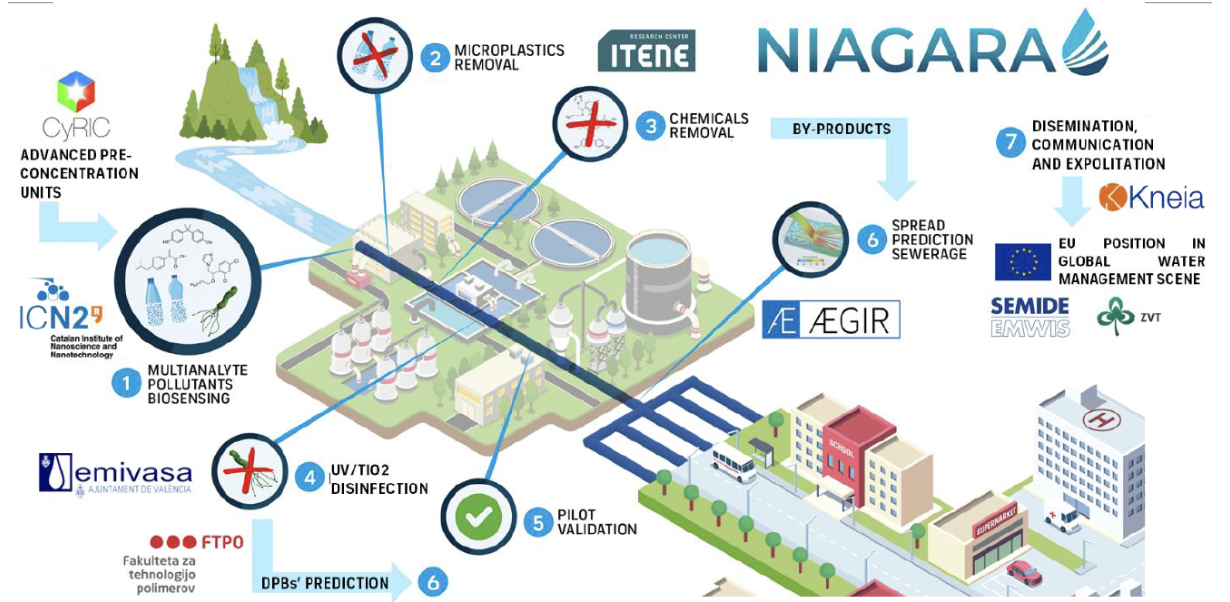Description:
The NIAGARA project compiles all the necessary approaches to provide a comprehensive response to the phenomenon of spread of pollution (chemical, microbiological and plastic) from drinking water sources to human exposure, through the Drinking Water Treatment Plants (DWTPs).
The objectives of the project are:
- To develop a cost-effective manufacture scheme for multi-analyte biosensors for water pollutants (BWP) for its rutinary use in DWTPs, with limits of quantification reaching the relevant values for human health. And validate it at lab-scale through the manufacture of a demonstrator for 4 highly relevant and concerning water pollutants: bisphenol A (BPA), Helicobacter pylori, imazalil and ibuprofen/paracetamol.
- To design and develop a manufacture scheme of an immobilized enzymatic degradation system (IEDS) to remove chemical pollutants and pathogens from drinking water in DWTPs. And to validate it at lab-scale for the removal of BPA, H. pylori, imazalil, and ibuprofen/paracetamol.
- To develop and validate at lab-scale an IEDS to remove nano-/micro- plastics (N/MPs) from drinking water in DWTP.
- To validate (lab scale) an efficient and safe disinfection method based on UV/TiO2 photocatalysis for its later pilot scaling, with comprehensive consideration of Disinfection by-products (DBPs) associated to our 4-analytes panel.
- To demonstrate our solutions at pilot level (TRL5), and their combined use in an innovative IEDS-UV/TiO2 tandem, for ensuring their safety towards human health, and their sustainability from early stages, establishing Safety and Sustainability-by-design criteria for all of them.
- To develop a highly accurate, cost-effective, fast, hydraulic model based on Smooth Particle Hydrodynamics (SPH) using the quantifications from our BWP (S.O.1) to predict the spread of pollutants and (UR)DBPs in real time in a pilot demonstrator (TRL5) of the drinking water distribution network (DWDN) in the city of Valencia (Spain), incorporating a multiagent model to elucidate human exposure data for risk management
The Euro-mediterranean Water Information System on know-how in the Water Sector (SEMIDE/EMWIS) is involved in different tasks in NIAGARA:
- Writing the Report on Stakeholder Mapping and analysis
- Creation and coordination of the international advisory board
- Writing of the Policy Recommendations Report and policy brief
The NIAGARA consortium includes 9 partners from 5 countries:
- Spain: ITENE Instituto Tecnologico Del Embalaje, Transporte Y Logistica; ICN2 Fundación Institut Catala De Nanociencia I Nanotecnologia; KNEIA SL; EMIVASA Empresa Mixta Valenciana De Aguas Sa (General De Analisis, Materiales Y Servicios Sl + Aguas De Valencia Sa)
- France: Unité Technique du SEMIDE GEIE; AEGIR
- Cyprus: CY.R.I.C Cyprus Research And Innovation Center Ltd
- Czechia: ART Zemedelsky Vyzkum, Spol Sro
- Slovenia: FTPO Fakulteta Za Tehnologijo Polimerov


